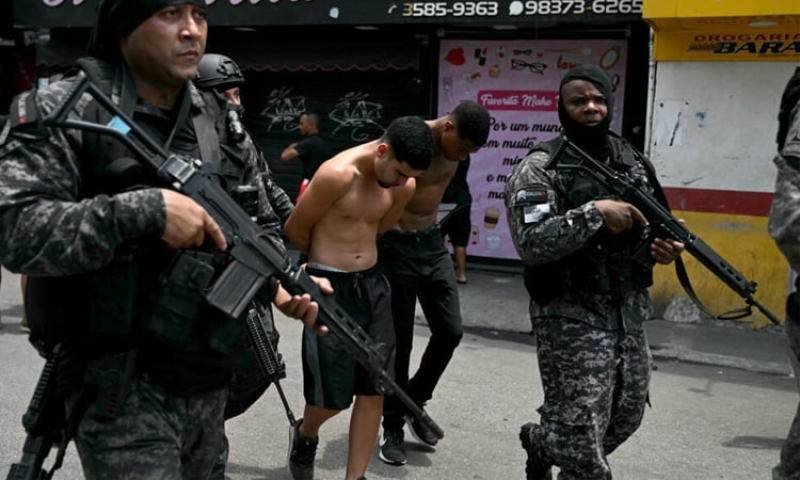- Bangladesh Bank Buys $115 Million to Support Forex Market |
- Tarique Rahman, Daughter Zaima Added to Voter List |
- NCP and LDP Join Jamaat-Led Eight-Party Alliance |
- Tarique Rahman’s gratitude to people for welcoming him on his return |
- Attorney General Md Asaduzzaman resigns to contest election |
At Least 64 Killed in Deadly Rio Drug Gang Raids

At Least 64 Killed in Deadly Rio Drug Gang Raids
Bodies piled up in Rio de Janeiro’s impoverished neighbourhoods on Tuesday as police launched their largest-ever operation against drug traffickers, leaving at least 64 people dead in scenes described as “war-like.”
Around 2,500 heavily armed officers, supported by armoured vehicles, helicopters, and drones, carried out coordinated raids targeting Brazil’s main drug-trafficking gang in the northern favelas of Complexo da Penha and Complexo do Alemão.
Gunfire echoed near Rio’s international airport as smoke rose from burning barricades hours after the raids began. Residents ran for cover, shops shuttered, and transport was disrupted as police claimed that traffickers were using drones to retaliate.
State Governor Claudio Castro described the operation as the largest in the state’s history, saying it aimed to stop the Red Command (Comando Vermelho) gang from expanding its reach. He reported that 60 suspected gang members and four police officers were killed. The operation was still ongoing late Tuesday afternoon.
“This is the first time we’ve seen criminals using drones to drop bombs in the community,” said a resident of Penha, who requested anonymity. “Everyone is terrified because there’s so much gunfire.”
Raids in Rio’s favelas are common, but this was the deadliest on record. The previous highest toll came in 2021, when 28 people were killed during a police operation.
Tuesday’s violence brought much of the city to a standstill, paralysing traffic on major roads. “We’re left without buses, without anything, in this chaos and not knowing what to do,” said 70-year-old retiree Regina Pinheiro.
Police mobilised two helicopters, 32 armoured vehicles, and 12 demolition vehicles to destroy barricades erected by traffickers blocking narrow streets.
Governor Castro posted a video on X showing what he said was a gang-controlled drone dropping explosives. “This is not ordinary crime but narcoterrorism,” he wrote.
However, human rights advocates condemned the scale and tactics of the operation. Congressman Henrique Vieira said the state government “treats the favela as enemy territory, with a licence to shoot and kill.”
The UN human rights office expressed alarm over the bloodshed, saying the operation “furthers the trend of extreme lethal consequences of police actions in Brazil’s marginalised communities.” It called for an immediate and transparent investigation.
Last year, about 700 people were killed in police operations across Rio — nearly two per day — prompting rights groups to denounce such raids as ineffective in dismantling criminal organisations.
Dani Monteiro, head of the Human Rights Commission of Rio’s State Legislative Assembly, said the panel would demand a full explanation of the “action that once again turned Rio’s favelas into a theatre of war and barbarism.”

